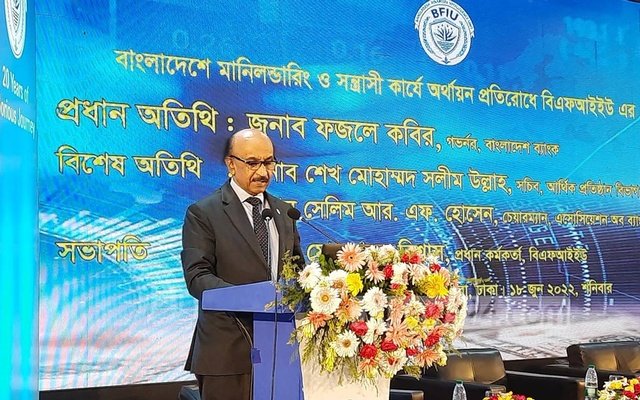Reserve comma is not something to be afraid of, ‘Comfort Zone’ Bangladesh: Governor
Referring to the current challenges in controlling inflation and the exchange rate of the dollar in the country’s economy, Bangladesh Bank Governor Fazle Kabir said, “There is nothing to fear as the reserves are declining. Bangladesh is in a comfortable position.”
He was speaking as the chief guest at a seminar on “20 years of BFIU to prevent money laundering and terrorist financing in Bangladesh”.
The seminar was organized by Bangladesh Financial Intelligence Unit (BFIU) at Bashundhara Convention Center in the capital.
“We have two new challenges in the economy – inflation control and the dollar exchange rate – coming together,” he said.
He noted that Bangladesh was still in a “comfort zone” in the context of recent foreign exchange reserves in the context of Sri Lanka’s economic woes.
“We are in surplus,” he said. Reserves are declining; But this is not a matter of fear. There was more before, but it has decreased. It’s not scary. “
However, advising bankers to be cautious in the current situation, Fazle Kabir said, “In the last financial year (2020-21) we have bought more dollars. But this time I am selling. The dollar has been used to support the government in importing some products including fertilizers, oil and food.
He also said that there is a little pressure on the reserve for this.
Since the beginning of the current financial year, the country’s foreign exchange reserves have been declining due to high import spending pressures. Bangladesh’s current reserves are 41.5 billion. As of August 2021, the reserves were just above 48 billion.
Referring to the current challenges in controlling inflation and the exchange rate of the dollar in the country’s economy, Bangladesh Bank Governor Fazle Kabir said, “There is nothing to fear as the reserves are declining. Bangladesh is in a comfortable position.”
He was speaking as the chief guest at a seminar on “20 years of BFIU to prevent money laundering and terrorist financing in Bangladesh”.
The seminar was organized by Bangladesh Financial Intelligence Unit (BFIU) at Bashundhara Convention Center in the capital.
“We have two new challenges in the economy – inflation control and the dollar exchange rate – coming together,” he said.
He noted that Bangladesh was still in a “comfort zone” in the context of recent foreign exchange reserves in the context of Sri Lanka’s economic woes.
“We are in surplus,” he said. Reserves are declining; But this is not a matter of fear. There was more before, but it has decreased. It’s not scary. “
However, advising bankers to be cautious in the current situation, Fazle Kabir said, “In the last financial year (2020-21) we have bought more dollars. But this time I am selling. The dollar has been used to support the government in importing some products including fertilizers, oil and food.
He also said that there is a little pressure on the reserve for this.
Since the beginning of the current financial year, the country’s foreign exchange reserves have been declining due to high import spending pressures. Bangladesh’s current reserves are ten 41.5 billion. As of August 2021, the reserves were just above 48 billion.
The dollar is depreciating sharply against the dollar in a crisis of supply against demand as import costs continue to rise. In June 2021, the dollar was 64 rupees 60 paise per dollar is now being exchanged at 92 rupees 75 paise.
According to the International Monetary Fund (IMF), a country’s foreign exchange reserves, such as its three-month import duty, mean that its repayment capacity is in a good position.
Pointing to that, the governor said, “Our reserves are now ten 41.5 billion. Having reserves to pay the import duty for three months means we are in a good place.
“A maximum of BILL 7 billion a month is needed to meet import obligations. And some government liabilities, service payments all together require a maximum of 626 billion in three months. “
At the seminar, Fazle Kabir emphasized on having ‘compliance’ in every aspect of the financial sector.
“The cost of not being compliant is more than the cost,” he said. We have to make sure that the criminals do not become active. “
He said that the money laundering law does not include cyber and gambling related crimes and advised the BFIU to include these two issues in the law.
He also called for further simplification or revision of Mutual Legal Assistance (MLA).
Regarding the floods in Sylhet, the governor said, “Now there is no question of recovering the loan from that area. Give them more new loans. Bangladesh Bank will look into the matter.
He said the central bank had already given instructions for flood victims’ expenditure from the bank’s CSR fund.
Speaking as the special guest at the seminar, Mohammad Saleem Ullah, Secretary, Department of Financial Institutions, Ministry of Finance, called upon all to perform their duties with integrity. He also said that the banks have provided ‘sufficient’ assistance in implementing the incentives.
Selim RF Hossain, Chairman of the Association of Bankers, Bangladesh (ABB) and Managing Director of BRAC Bank, said at the seminar, chaired by BFIU Chief Masud Biswas, “BFIU is now working on a much larger scale. It’s a pleasure. Through them many officers of the bank have also received training. The banking sector is reaping the benefits.
Mohammad Shams-ul Islam, managing director of state-owned Agrani Bank, said, “The dollar has risen now. Eid remittances are not growing as they should. We think it will increase around Eid. For this, the central bank can provide policy assistance in terms of expenditure.
Arfan Ali, managing director of Bank Asia, said: If all transactions are done through banks, the amount of illicit money will be reduced. Everyone will get the benefits of development.
Masroor Arefin, Managing Director, Citibank, said: It’s also a big financial crime.
















